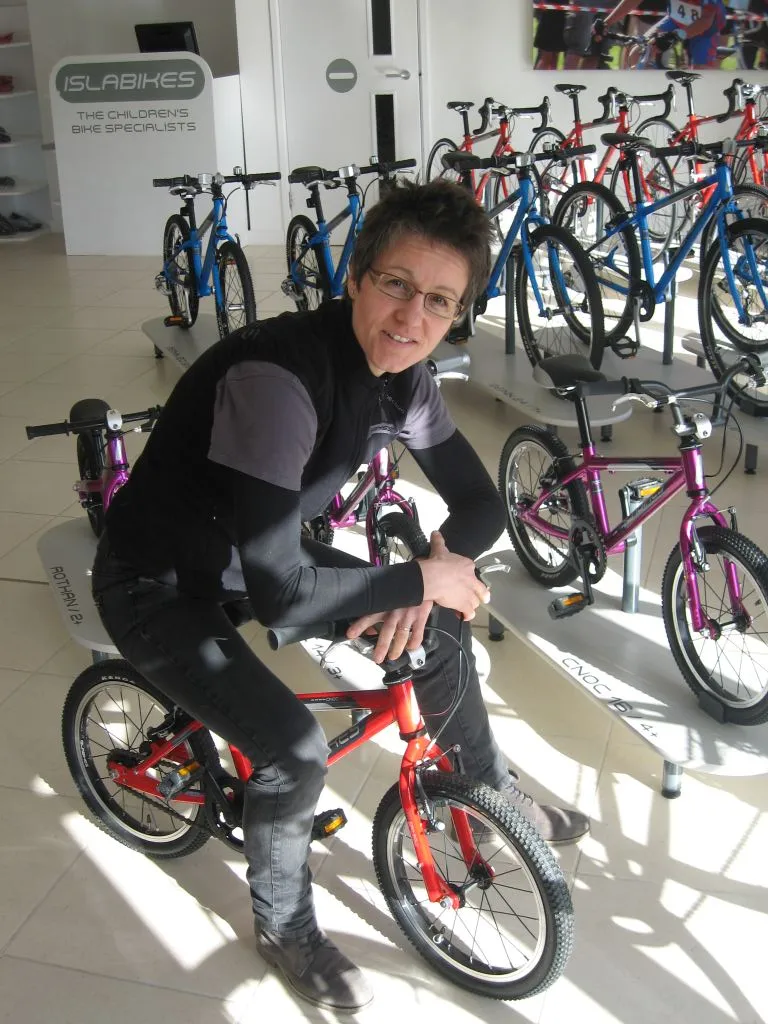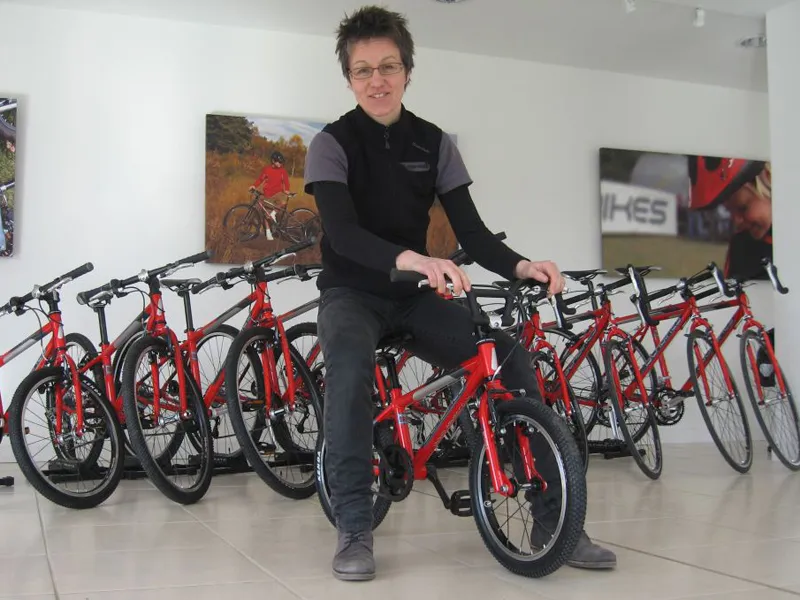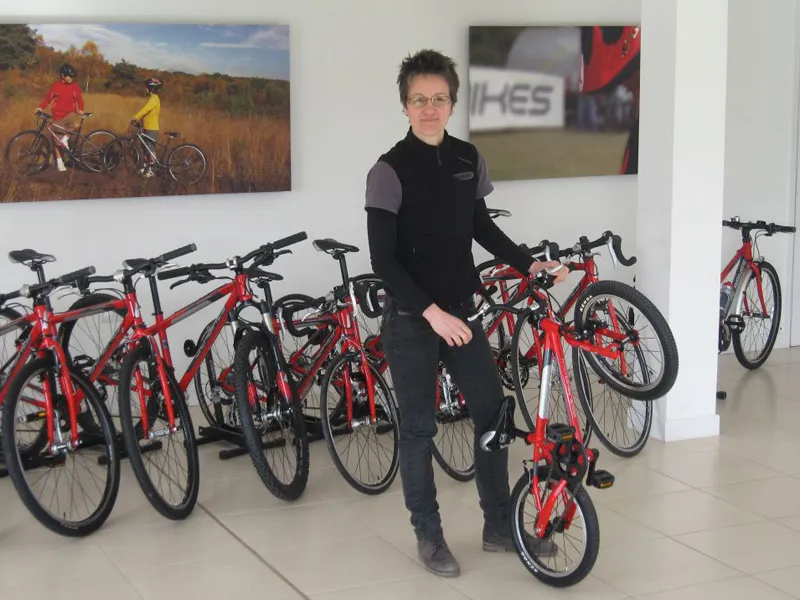Isla Rowntree is the founder and designer at Islabikes, a UK company producing quality children’s cycles to great media and customer acclaim. We spoke to her about wheels both big and small, the allure of cyclo-cross and L-shaped cranks.
On designing kids’ bikes
“I was drawn to kids’ bikes because what was available just seemed so poor. We all know how much difference a light, well-fitting, well-adjusted bike makes to our enjoyment of cycling, so why were we putting our kids on such heavy and difficult-to-use bikes? That was where I started, simply wanting to improve kids’ experience of cycling in the hope more of them would enjoy it and want to do it again and again. As a small adult I think I brought some user insight to what it’s like trying to ride with parts that don’t fit, and was able to apply that right down to tiny people! Like most designers I’m continually trying to improve what we do – I am never satisfied!”
On re-establishing Islabikes
“[It’s been] a great ride. The time has flown by. Like anything there are tricky bits and challenging bits, but so many good things shine through.”
On her design priorities
“Fit, function and weight.”
On 'adult' bikes
“We have no plans for more adult bikes. Our Beinn 29 was introduced for the parents of our existing kids’ bikes customers. When your four-year-old is learning to ride you tend to go to somewhere like a park and help them ride round, developing their skills – you don’t ride with them as such. Then, when they get their first more grown-up bike at about six-years-old, you can think about actually going out together as a family. Often, at this point, at least one parent doesn’t have a bike. They were asking us for something suitable to accompany the kids on family leisure rides.
“We wanted to produce a bike that did this job really well, in the hope that cycling would capture that parent’s imagination and make them want to do more of it. And if it did, we wanted the bike to grow with their enthusiasm rather than restrict it. A Beinn 29 with off-road tyres will allow you to try cross-country riding, will easily accept mudguards and narrow tyres for riding to work, a rack and panniers if you want to go touring or pack a picnic, and can even be converted to hub gears or singlespeed for low maintenance. Obviously, if you really get into things you’re going to want to buy a more expensive, specialist bike, but hopefully the Beinn 29 will still find use as a hack!”
On wheel size
“Of course [it matters]. For riding on anything other than very smooth surfaces, the biggest wheel size that works with your body size will give you the smoothest ride. There are specialist situations where a smaller wheel might be more suitable – for example, dirt jumping or folding bikes (I have a Brompton and it’s brilliant at what it sets out to do. But for most non-extreme riding (and a few extreme situations, too) bigger is better. That said, I don’t know why people get so emotional about what size wheel is on a mountain bike – as long as you’re out there riding, who cares?”

Wheel size matters
On the allure of cyclo-cross
“There’s something about riding unsuitable bikes off-road in bad weather in the middle of winter that brings people together – the atmosphere at ’cross races is so friendly. There’s a real sense of community in most of the local leagues, and the national league too. You can pretty much squeeze a course in anywhere, which makes the events accessible, and all the family can (and very often do) take part. All abilities are able to participate because the race length is based on time instead of distance, so everyone finishes at the same time. Personally, I love the sensation of riding a ’cross bike fast in a race – it’s good old adrenaline and fun. [And she’s successful, too – Isla has many Elite and Veteran National Cyclo-Cross titles to her name, among many others – Ed].”
On her hopes for the future
“Personally – to have the physical capability to be able to carry on enjoying my cycling for many years to come. For the business – to build on what we've achieved so far, to bring a positive cycling experience to more children. For the world – to work together towards a more sustainable way of living, with the hope it really will lead to peace.”
On the Olympics
“[It will be a] sensation – the International Olympic Committee have moved the goalposts, so we’re not going to get the same medal tally as in Beijing, but I still think we’ll be amazing.”
On form and function
“In a product with a practical purpose, function should always come first. But in the very best designs, form and function co-exist seamlessly.”
On the effects of the global economic climate
“The bike industry is in a pretty good place right now, due to the recent rise in the popularity of cycling – as an industry we’ve been lucky not to experience the worst effects of recent economic events. For riders, if you’ve lost your job or you’re worried you’re about to, it’s pretty stressful and you aren’t going to be buying the latest new equipment. But that doesn’t mean you can’t ride – any bike that’s in working order provides an escape for a while. There are some really good British manufacturing businesses out there, including some fine examples in the bike industry, but as our media aren’t good at focusing on the positives it’s easy to get caught up in all the doom. That said, I do think the government could be doing more to support grassroots manufacturing in the UK. We need a long-term cultural shift in our attitude to manufacturing. It’s an area that’s been neglected for too long, particularly in our education system.”
On the biggest dead-end trends of the past
“L-shaped cranks. Whoever thought of that, and how did they manage to persuade so many people to use them? Unbelievable. I’m still not sure now it wasn’t some elaborate practical joke. As for other trends, it’s rare they’re a true dead end. Even if they don’t really stick in the long term, they usually inform what comes next, so are all part of the design evolution.”
On the most important bike innovations
“Integrated shifters on road bikes; lights – bike lights used to be truly appalling; clipless pedals. If I was just allowed to keep one development from the last 20 years it would be the lights.”
On conquering trail demons
“I’m not sure I have any demons when I’m out on my bike. I just have fun. Like everyone else, I have days when I’m riding badly, usually after I haven’t ridden off-road for over a week, but I stopped worrying about it a long time ago, as I know I only have to go out again and everything will be back to normal. One of the advantages of having done this for a very long time is that you make better decisions, so you’re less likely to get into situations that spoil a ride – you generally choose the right clothing (having checked the weather forecast), consume enough food and drink, remember to bring your puncture spares, keep the crucial things on your bike in working order, remember your money for the post-ride drink…”
On the trends to watch in 2012
“Hub gears, single chainrings and hydraulic shifting. Particularly hydraulic shifting – all the big players are focusing on electronic at present but I don’t feel comfortable with that. A bike is supposed to be human powered, and having a battery that reduces even the slight energy required for shifting just seems wrong. But we do need to get rid of cables – they require so much maintenance in our climate. German company Acros have introduced a hydraulic gear system for mountain bikes. It’s incredibly light and equally expensive, due to all the individual parts being CNC machined. Presumably because they don’t want to invest in moulds until they’ve bedded down the technology. It would be good to see the big players getting involved, but top marks to Acros for bringing this to market.”
On what keeps her in the saddle
“I love the sensation of riding a bike – any bike, anywhere. I almost always really enjoy it. Since I moved to Ludlow, most of my riding has been cross-country mountain biking [Isla is also the 2010 and 2011 Veteran National Cross-Country Mountain Bike Champion – Ed]. I haven’t done any formal training for a few years but I ride most days – I ride to work (four miles in wellies), ride to the shops, ride to the theatre, ride to the pub and ride in the woods. Last weekend we had our work’s annual ‘big trip’ – 90 miles off-road, place-to-place with panniers. We got the train to Aberystwyth on Friday night, and after a late-night dip in the sea rode back over the mountains. Nine of us completed the trip and we were met by a ‘greeting party’ of colleagues on Sunday afternoon, to ride the last few miles together. Three of the participants had never done anything like it before, and it was amazing to share the experience alongside them. Three Beinn 29s did the trip too, which proves you don’t need to spend mega bucks on a bike to do extraordinary things!”

